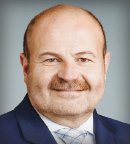NYU Langone Health’s Laura and Isaac Perlmutter Cancer Center opened a new state-of-the-art center to treat people with hematologic malignancies, including leukemia, lymphoma, and multiple myeloma.
The new center, led by Samer Al-Homsi, MD, MBA, Clinical Professor in the Department of Medicine and Executive Director of the Transplantation and Cellular Therapy Center at Perlmutter Cancer Center, will provide patients with a health-care team and services dedicated to blood and marrow transplants and cell therapy.
“At the new center, blood cancer patients now have all necessary services in one location in Manhattan, performed by highly specialized providers dedicated to bone marrow transplants and cell therapy,” Dr. Al-Homsi said.
With a focus on haploidentical transplants, the center has expanded the pool of potential donors for patients from certain ethnic groups. Coupling innovative approaches for preventing graft-vs-host disease with enhanced supportive care, the center is now able to offer transplants to almost every patient in need of such treatment regardless of ethnic background or age, thus tackling an important health-care disparity issue.

Samer Al-Homsi, MD, MBA
“Half-matched transplants offer hope for underrepresented patient populations, such as African Americans, Asian Americans, and Latinos, for whom the probability of finding a matching donor in the Be The Match Registry is as low as 35%, compared with an 80% chance for White patients,” Dr. Al-Homsi commented. “From day one, we have focused on addressing this health-care disparity to provide transplants to patients who would otherwise not have a donor.”
Transplants on an Outpatient Basis
A major advantage of the new Transplantation and Therapy Center is the ability to perform blood and marrow transplants on an outpatient basis. Currently, patients undergoing transplantation are admitted to the hospital for 3 to 4 weeks. Outpatient transplants will be available for certain patients, such as those receiving autologous transplants, who meet specific criteria, including residing within a certain proximity to the center and having adequate support to travel between the center and their homes.
“Outpatient transplants bring our premier service to the New York City metro area and allow patients to stay in the comfort of their homes surrounded by their families,” Dr. Al-Homsi stated.

